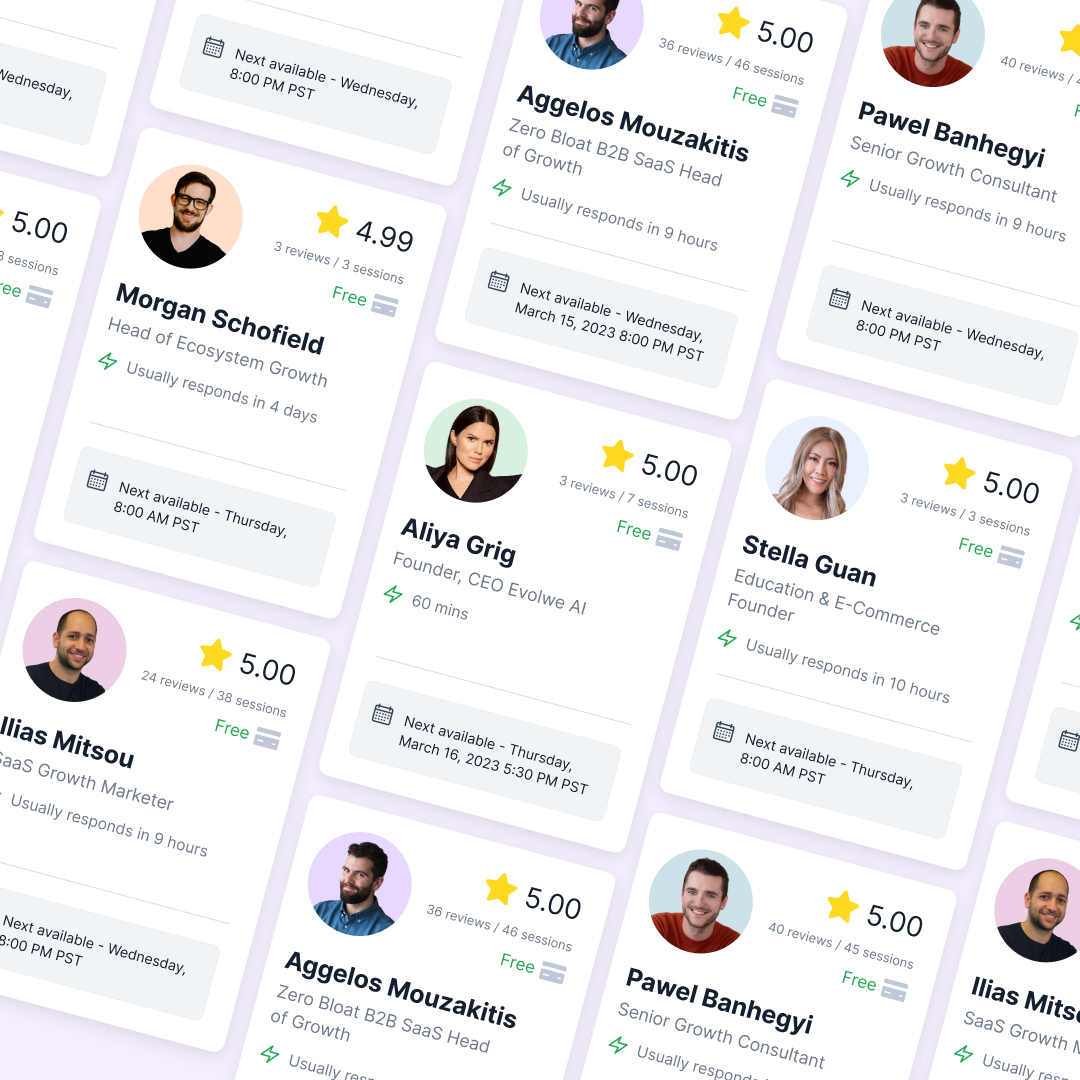8 Skills Every New Bootstrapped Founder Needs to Know
If you’re bootstrapping a startup, you’ll need a slightly different set of skills than most founders getting funding.
But, it can be hard to know where to start. Which is why we’ve rounded up the top 8 skills for bootstrapped founders.
And you can learn all of them by chatting with some of GrowthMentor’s 700+ mentors. To narrow your list, we’ve recommended mentors who can help you start your journey.
Worried you’ll get stumped on what to ask? Not to worry—we looked at questions our members asked their mentors on GM and rounded up the top 7 most-popular questions for each skill.
Let’s dive in.
Bootstrapping
Why You Need The Skill: If it’s your first time bootstrapping, you’re probably wondering what the landscape looks like.
After all, there are dozens of methods available to finance a business that don’t involve traditional angel investing and VC funding routes.
But naturally, those options come with trade-offs, typically in the form of much tighter budgets.
And as with any entrepreneurial route, the path isn’t risk-free.
If you talk to a mentor, however, you can get a feel for the lay of the land and understand the possible pitfalls or unknowns you need to watch out for while growing your startup.
Here’s what to talk about:
- What are our financial options for bootstrapping?
- How do we keep overall costs as low as possible?
- What marketing strategies are best for bootstrapped businesses?
- Are our expectations and plans realistic considering our budget?
- How do we acquire users with an MVP product?
- What are the unknown unknowns involved in bootstrapping?
- What future possible pitfalls do we need to be aware of?
Who to Talk To:

Co-Founder @ Design For Decks, COO @ tallk.ai
Idea Validation
Why You Need The Skill: If you’re bootstrapping, you’re either fronting the cost of the business yourself or taking on debt in order to finance it.
And while not needing the vote of confidence from angel and VC investors is freeing (and preserves your equity), it also means you’re the only one with an opinion on the business and product until you have users.
Which means you’ll want to be even more cautious about validating your idea from the start.
The good news is most idea validation is a series of stages. And at each stage, you have the opportunity to continue forward or pivot.
A mentor can show you the possible path ahead, helping you figure out which steps you should and shouldn’t take as you work through validating your idea.
Here’s what to talk about:
- How do we get feedback from users on an MVP?
- What are the best methods and frameworks to validate an idea?
- How do we estimate our market for an idea?
- Can we get unbiased, third-party feedback on our idea?
- How much time and effort should we spend on validating an idea?
- How do we know when our idea is validated?
- We’re not sure what next steps to take to validate our idea. What do we do?
Who to Talk To:

Founder
GTM Strategy
Why You Need The Skill: You can’t bring a product or service to market without a go-to-market strategy.
Unfortunately, it’s also the place where most founders go astray. Some run their go-to-market tactics totally off the cuff with zero planning or strategy. Others end up stuck in analysis paralysis with preparing to act rather than executing.
Not to mention there are a ton of moving parts and it can be easy to miss certain critical steps.
Talking to a GTM mentor can help make this process far less mysterious. They’ll break the topic down into manageable actions and show you how to focus on the right processes to make sure you get a steady stream of customers through the door.
Here’s what to talk about:
- If we’re bootstrapping, should we eliminate certain GTM motions?
- What GTM motion should we try first?
- We’re considering a certain GTM motion. What marketing channels should we use for that motion?
- How do we determine our messaging and positioning?
- How do we ensure we’re communicating our positioning clearly to users?
- We’re unsure about our current plans. Can we get honest feedback on whether they make sense?
- We have multiple possible routes moving forward. How can we narrow down which ones have the best chance of success?
Who to Talk To:

Growth + Product Marketing Advisor and Coach, Mobile apps, B2C, Brand, Leadership
Product-Market Fit
Why You Need The Skill: While this may be where most founder’s minds go to even before go-to-market, it can sometimes take far longer than expected to hit P-M fit.
On top of it, you don’t need to have product-market fit perfected right off the bat.
But, it’s a critical component to a long-term success. And with all the variables to juggle, it’s easy to get pulled off-track.
So think of it as a journey. A product-market fit mentor can help map out your path and show you what steps you need to take to keep moving forward as well as pitfalls to avoid along the way.
Here’s what to talk about:
- How do we develop a roadmap for finding product-market fit?
- Are there any frameworks we can use to increase our chances of finding P-M fit?
- What’s the best way to narrow down our potential ICP?
- What should we do to get more clarity around our initial steps with finding P-M fit?
- How do we get feedback to make a product that should be built?
- How do we iterate on our findings and feedback from our users to continue improving the product?
- How do we know if we’ve achieved product-market fit?
Who to Talk To:

Guide to Product/Market Fit
Copywriting
Why You Need It: When you’re just getting a startup off the ground, you’ll need to build a website or landing pages to show your potential customers why they should buy from you.
While good design and splashy visuals can go a long way, a huge chunk of convincing those users is going to come down to…you guessed it, your copy.
Copywriting mentors can help you break down your user’s pain points, desires, and needs, translate that into a solid psychological map you can then use to create copy that gets conversions.
Here’s what to talk about:
- How do we improve our website’s copy?
- What can we do to emphasize our competitive differentiators?
- How long after launch do we need to wait before testing different copy variations?
- What’s the best way for us to position our USP?
- How do we help our users understand our key value proposition in emails?
- How do we figure out if copy changes are helping or hurting our conversion rates?
- What’s the best way to simplify our value proposition?
Who to Talk To:

Fractional Product Marketing | 0 to 1 Growth Marketing tactics | 2x Founder
User Research
Why You Need It: Most founders think that user research is a high cost endeavor and they don’t need to use it until much later down the road.
That’s simply not true. Done right, you can run user research for almost no cost (but your time) and reap massive rewards for it.
In fact, the four previous skills we listed (GTM strategy, idea validation, PM fit and copywriting) all require some form of user research to optimize.
A mentor can help you identify the lowest cost methods of user research, plus teach you how to make the most of your time with users and synthesize your findings into actionable next steps.
Here’s what to talk about:
- How can we recruit users for our research programs quickly?
- What are the best user research methods that require minimal spend and resources?
- How do we analyze our interview findings?
- What’s the best way to synthesize findings and identify trends?
- What mistakes do we need to avoid when conducting user research?
- How do we prioritize our user research projects?
- Once we conduct our user research, how can we make sure to take action on it?
Who to Talk To:

Founder | YC alumni | Forbes 30U30 Asia
Sales
Why You Need It: Unless you’re going with a pure PLG motion, founder-led sales are one of the cheapest ways to get new customers. And if you decide to take this GTM route, you’ll likely have a ton of questions.
Unfortunately, it’s also one of the few areas where founders feel you have to have a natural talent for it. (Spoiler alert: you don’t.)
A mentor can help you tackle the strategy and tactical questions around sales. Plus, they’ll show you tips and tricks with getting more comfortable with selling, and prove you don’t have to be a natural salesperson to make the most of your sales GTM.
Here’s what to talk about:
- How do we improve the retention rate of our sales funnel?
- How do we speed up our pipeline -> conversion rate?
- What can we do to improve our outbound sequences?
- How do we improve our close rates?
- How can I improve my storytelling skills for better sales presentations?
- What sales collateral do we need to create?
- Can we get honest, third party critique on our sales deck and pitch?
Who to Talk To:

Startup and Ecommerce Coach and Advisor
Mindset Coaching
Why You Need It: Like it or not, building a startup is an emotional ride. And especially if you’re a solopreneur, it’s easy to get caught up in the daily frustrations and setbacks without focusing on your smaller successes.
Ultimately, it’s a recipe for overwhelm, burn out and sometimes even founder depression.
A mentor can be a sympathetic ear to listen while you vent frustrations, and help you get your head on straight to face the next challenge.
Here’s what to talk about:
- How do I deal with overcoming imposter syndrome?
- We’re losing enthusiasm for our original idea. Should we pivot?
- How can I learn to better delegate without micromanaging?
- How do I effectively prioritize all the projects my startup has going on?
- I’m finding myself stuck in analysis paralysis. How can I bias myself towards action rather than just thinking?
- How do I deal with overwhelm when times get tough?
- What can I do to avoid burning out?
Who to Talk To:

🕸️Fractional Chief Marketing Officer | 📺 TV Host | 🎧 Podcaster |🐒 CSO Zoo | Founder 🚲 | 👠Ultra-Marathoner
Now, you could try to learn all these skills through courses or DIY research. But it’s faster and easier to learn from someone else’s experience and expertise instead.
We know you have more important work to do on your startup than spend ages on cold-outreach to mentors.
So skip all the trial-and-error when it comes to learning these 8 all-important skills.
Join GrowthMentor to save yourself time, frustration, and money as you take the next steps on your bootstrapped startup journey.
Want to build your bootstrapping skills?

